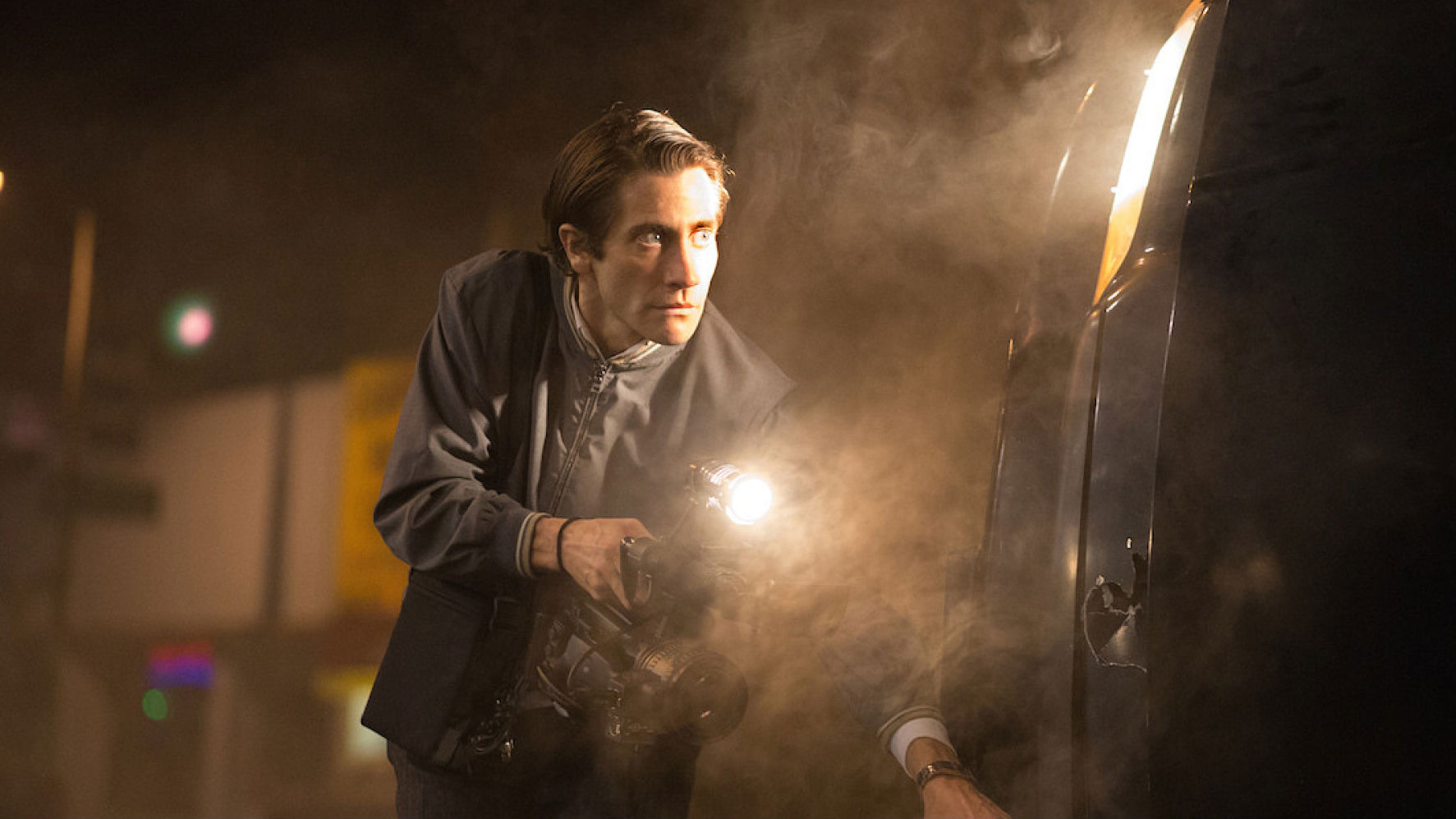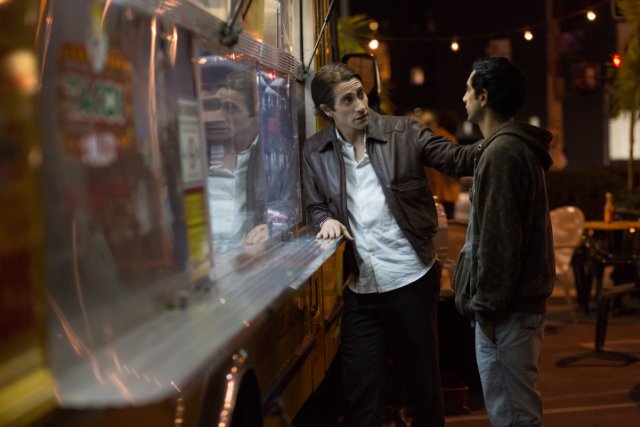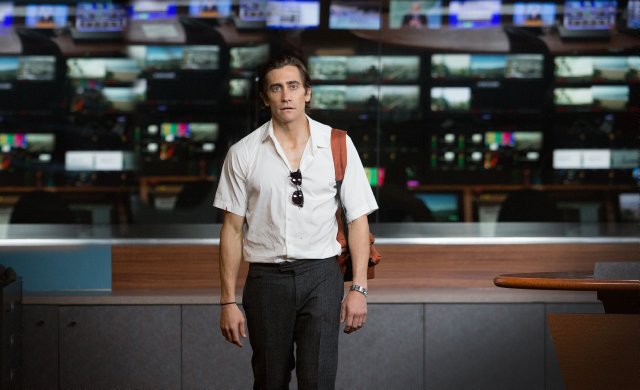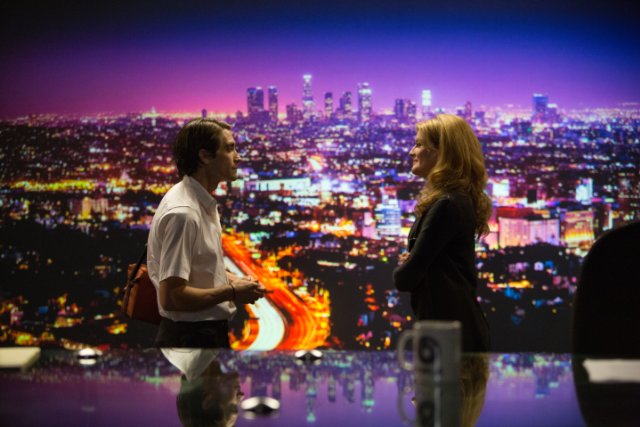Nightcrawler is grotesque, an express delivery service for laughter and revulsion. That’s an appropriate mode for a film that is at once a thriller, a social commentary on shock journalism, a satire of the Managerial Man, and a study in obsession. And writer/director Dan Gilroy and his team pull it off.
Jake Gyllenhaal leads the grubby cast as Lou Bloom, an obsessive, manic aspiring businessman with the perfect name. We meet Bloom stripping copper wire in the dead of night. When confronted by a security guard (with a nice watch), Bloom slithers from polite explanation to murder in the blink of an eye. It’s the opposite of a Save the Cat moment, and it sets the tone for what follows.
 Chuck Zlotnick
Chuck ZlotnickSoon after this encounter, Bloom passes a vicious accident—cops pulling a woman from burning wreckage. Where some would stare, despite not wanting to, Bloom gets out of his car and gets as close to the scene as possible. A blubby unshaven man muscles past him to get a good shot. This is Joe Loder (played by Bill Paxton), a man who can make a line like “Welcome to the future, brah” sing even when we were supposed to have hit peak irony a few years ago. He’s a stringer, a camera man who chases accidents in the hope of selling footage to TV stations—and he’s just shown Bloom the perfect job. The story is filled out with an excellent cast of grubby characters, from Bloom’s homeless intern Rick (Riz Ahmed) to aging, vulnerable TV producer Nina (Rene Russo).
If you wished Gone Girl had focused more on the world of popular news, Nightcrawler is for you. As Loder puts it, “If it bleeds, it leads.” Nina is up front with Bloom: bring her gory footage from well-off white neighborhoods. “Think of our business as a screaming woman running down the street with her throat cut,” she tosses off jadedly. Gyllenhaal’s wide-eyed grin comes just a little too quickly, another rung for the audience to cling to on the Hitchcock’s Ladder of suspense.
 Chuck Zlotnick
Chuck ZlotnickJake Gyllenhaal, people. Lou Bloom unleashes what the actor’s other obsessed detectives (Zodiac, Prisoners) have all kept bottled up. He sits in his apartment hunched over an ironing board, obsessively removing wrinkles, cackling at an old comedy with just the slight suggestion that in his head, he’s not alone. He gives a motivational speech that would be innocently funny if we couldn’t see a throbbing and pulsing vein (and this wasn’t a close-up either). He might be the post-recession cousin of Christian Bale in American Psycho. It’s as if Humphrey Bogart had a baby face, lost all his marbles, and gotten a subscription to the Harvard Business Review. Everything’s a case study—most disturbingly his romantic extortions of Nina.
Acting is a mystery, but there are some specific choices here we can applaud. For example, someone could write a medium-sized paper about how Jake Gyllenhaal uses his eyes. In Prisoners he built a whole character out of a squinty double-blink facial tic. Here his eyes are wide, white, and glistening, like hard-boiled eggs.
Gyllenhaal uses his voice perfectly, too. There is none of the laid back, deeper worldliness of his tougher performances, say in End of Watch or Prisoners. He speaks, at a higher octave, the language of business: all of his conversations are either PowerPoint presentations or commercials.
 Chuck Zlotnick
Chuck ZlotnickThis all of a piece with the total grotesquery. Most of the film looks like a cheap motel room—lots of neon, lots of yellow light to give Gyllenhaal’s skin a sallow and malnourished tinge. This clicks with the TV clips—lurid, motion smoothed, Public Access.
The score is composed entirely by James Newton Howard, the eight-time Academy Award nominee and co-winner of the Grammy for The Dark Knight with Hans Zimmer. It veers back and forth between vintage LA’s soft synth and electric guitar, and symphony. This reaches a nice balance in the denouement, where the line between heavenly choir and cheesy keyboard blurs, perfectly underlining a story about people who worship schlock.
“It all looks so real on TV,” says Bloom with tears in his eyes. Nightcrawler is a disturbing portrait of what happens to someone when it thinks their only means of existence is mediated through the phantasms of television and the internet. Oh, it also has a good car chase.
This film is Dan Gilroy’s directorial debut. Hopefully it is the first of many.
Caveat Spectator
The language is the harshest part of this movie. There are more than a few F-bombs. Sex is only implied in dialogue, never shown. The film is also violent—a few characters get shot with puffs of blood spraying the air, and there are more than a few graphic crime scenes shown (bleeding bodies being treated by ambulances, a woman killed with a shotgun laying on a couch). It is worth noting that the point of the film is to show this whole industry as disgusting.
Tim Wainwright's writing has been featured in The Atlantic, CT, and RealClearMarkets. He tweets here and blogs here.











